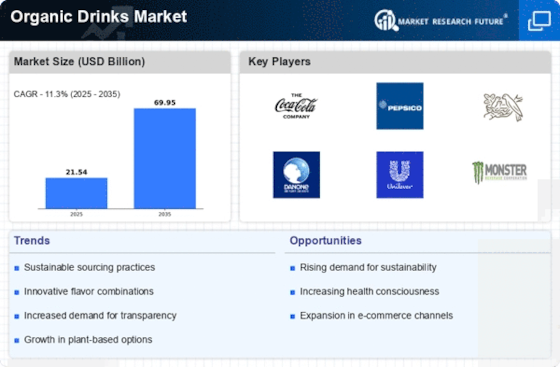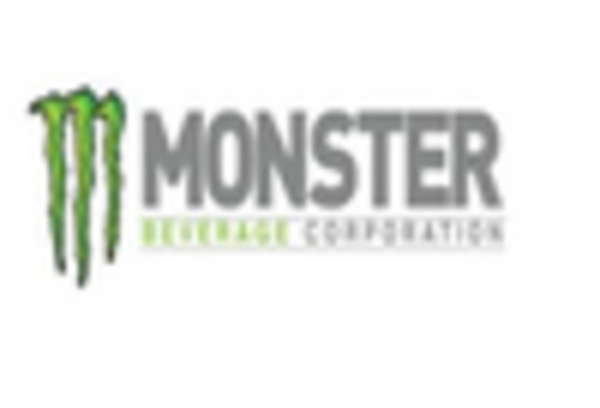Market Share
Organic Drinks Market Share Analysis
Market share positioning strategies are crucial in determining the success and competitiveness of brands within the organic drinks market. One prevalent strategy involves differentiation through product innovation. Brands seek to set themselves apart by introducing unique and appealing organic beverage formulations, such as exotic fruit blends, functional health drinks, and innovative flavor combinations. This not only attracts health-conscious consumers but also fosters brand loyalty by offering a distinctive value proposition in a saturated market.
Pricing strategies play a significant role in the market share positioning of organic drinks. While organic beverages often command a premium due to the perceived quality and natural ingredients, some brands strategically position themselves as more affordable options. This approach aims to tap into a broader consumer base, including those who may be price-sensitive but still value organic and healthier drink choices. Striking the right balance between premium quality and competitive pricing allows brands to cater to a diverse audience and capture a larger market share. The organic drinks market is experiencing substantial growth globally, propelled by the strong consumer preference for products carrying the organic and pure label. This widespread desire reflects a significant shift in consumer values, with individuals increasingly seeking beverages that align with their health-conscious and environmentally conscious lifestyles. The market is anticipated to grow at a noteworthy rate of 13.00% between 2023 and 2032, underlining the escalating demand for organic drinks.
At the core of this market expansion is the global demand for beverages that go beyond conventional offerings, offering consumers a healthier and more natural alternative. The appeal of organic drinks lies in their association with health benefits, as these beverages are produced using organic farming methods, avoiding synthetic pesticides, herbicides, and genetically modified organisms.
A key trend driving market growth is the rising popularity of organic and natural teas and coffees. Consumers are increasingly opting for organic variants of these daily staples, seeking a more wholesome and natural experience. This shift in consumer behavior extends beyond beverages to fruits and vegetables, with consumers demonstrating a preference for organically labeled items, showcasing a heightened awareness of the potential health risks associated with conventional farming practices.
In response to this growing demand, key players in the organic drinks market are focusing on product innovation, introducing a diverse range of organic drink varieties to cater to evolving consumer preferences. As the trend towards organic and pure label goods gains momentum, the organic drinks market stands as a testament to a broader movement towards conscious consumerism, where choices are made in alignment with values of health, sustainability, and environmental responsibility. Strategic partnerships and collaborations are increasingly common in the organic drinks market. Companies form alliances with organic ingredient suppliers, sustainable agriculture initiatives, or other stakeholders in the supply chain. These collaborations ensure a consistent and high-quality source of organic ingredients, enhancing the overall credibility and sustainability of the brand. Joint marketing efforts and co-branded products can also help expand market reach and strengthen market positioning.
Geographical expansion is a notable market share positioning strategy in the organic drinks segment. Brands aim to capitalize on the increasing demand for organic and healthier beverage options by expanding their distribution networks and entering new markets. This strategy involves adapting products to meet regional preferences and regulatory requirements, allowing brands to cater to diverse consumer needs. Geographic expansion not only broadens market reach but also helps companies mitigate risks associated with dependency on specific markets.
The emphasis on digital presence is another strategic move within the organic drinks market. With the rise of e-commerce and digital marketing, brands are investing in their online presence to reach a wider audience. E-commerce platforms provide a convenient avenue for consumers to purchase organic drinks, especially considering the demand for doorstep delivery and online shopping convenience. An effective online presence allows brands to engage directly with consumers, build brand awareness, and enhance customer loyalty.
Sustainability and ethical positioning are gaining prominence as market share strategies in the organic drinks market. Consumers are increasingly drawn to brands that prioritize eco-friendly and socially responsible practices. Companies that adopt sustainable sourcing, ethical production methods, and environmentally friendly packaging can differentiate themselves in the market. This aligns with the values of consumers who prioritize sustainability, contributing to long-term brand loyalty and positive market positioning.


















Leave a Comment